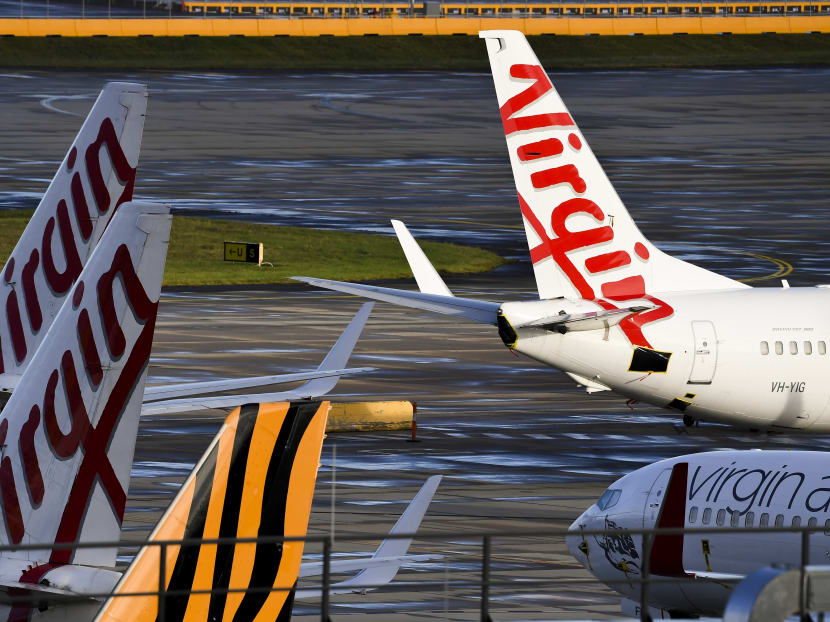Virgin Australia, partly owned by SIA, collapses under coronavirus strain
BRISBANE — Cash-strapped airline Virgin Australia announced it had gone into voluntary administration on Tuesday (April 21), making it the largest airline to collapse under the shock of the coronavirus outbreak.

Virgin Australia announced it had gone into voluntary administration, making it the largest airline to collapse under the shock of the coronavirus outbreak.
BRISBANE — Cash-strapped airline Virgin Australia announced it had gone into voluntary administration on Tuesday (April 21), making it the largest airline to collapse under the shock of the coronavirus outbreak.
In an announcement to the Australian Stock Exchange (ASX), Virgin said it planned to keep operating flights despite handing over the keys to administrators.
"Our decision today is about securing the future of the Virgin Australia Group and emerging on the other side of the Covid-19 crisis," CEO Paul Scurrah said in the statement.
"Australia needs a second airline and we are determined to keep flying."
The airline was more than AUD$5 billion (S$4.51 billion) in debt and had appealed for an AUD$1.4 billion loan to stay afloat, but the government refused to bail out the majority foreign-owned company.
More than 90 per cent of Virgin's shares are controlled by a group of investors including Singapore Airlines, Etihad Airways, Chinese conglomerate HNA Group and billionaire Richard Branson's Virgin Group, which have all suffered a sharp deterioration in revenue because of the pandemic.
Virgin said the current management team led by Mr Scurrah would continue to run the business and it would still operate scheduled domestic and international flights to help transport essential workers, maintain freight corridors and return Australians home.
"This is a tough day for our airline but it is certainly not the end. We are not collapsing," Mr Scurrah told reporters.
Virgin said it had appointed Deloitte as its administrator, after the airline was unable to secure the federal government loan.
Deloitte partner Vaughan Strawbridge told media that more than 10 parties had already expressed interest in a restructuring plan and his team was reaching out to bondholders to discuss options.
A deal is most likely to involve a deed of company arrangement, which is a binding agreement with creditors, and the aim is to complete it within a few months, Mr Strawbridge said.
Australian private equity group BGH Capital is among the interested parties, two people familiar with the matter told Reuters on condition of anonymity. BGH declined to comment.
Administration is Australia's closest equivalent to the Chapter 11 bankruptcy provisions used to restructure companies in the United States.
Moody's said unsecured creditors were likely to take a significant haircut on the value of their debt as part of any deal, and that it might be preferable to put the company in liquidation with uncertain recovery prospects.
The government has appointed Mr Nicholas Moore, who for a decade led Macquarie Group, to engage with the administrator in order to find a "market-led solution" with a view to keeping two airlines on key routes, Australian Treasurer Josh Frydenberg told media.
Virgin employs 10,000 people directly and 6,000 people indirectly in competition with larger rival Qantas Airways, which would have a virtual monopoly in Australia if Virgin stopped flying. Qantas shares jumped as much as 7.2 per cent on Tuesday to their highest level since March 12, before falling back to 1.4 per cent in afternoon trade.
Virgin had A$5 billion of debt as of Dec 31 and had reported seven consecutive annual losses before the coronavirus outbreak decimated domestic and international demand, forcing Virgin to ground the bulk of its fleet and put most staff on leave.
Virgin, which grew rapidly after the collapse of the country's then second-largest carrier Ansett in 2001, has a share of around one-third of the Australian domestic aviation market but that could decline under a restructuring plan.
Dr Rico Merkert, a professor of transport at the University of Sydney Business School, said Virgin should focus on running a core fleet of Boeing 737 planes on key domestic capital city routes rather than also flying widebodies and regional turboprops.
Mr Strawbridge, the administrator, said the airline was seeking talks with Boeing about the future of its order for 40 737 MAX planes. The model has been grounded globally for more than a year after two fatal crashes.
Mr Branson said on Twitter that his company would work with administrators, the management team, investors and government to get Virgin Australia back up and running.
Estimated global airline losses from the pandemic have climbed to US$314 billion (S$448 billion) and led to industry warnings that carriers will collapse without sufficient government aid. AGENCIES









